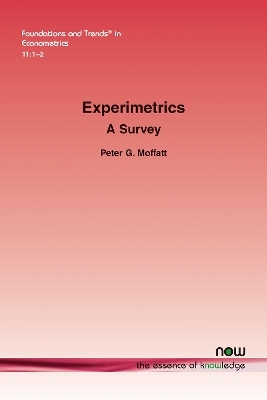
Experimetrics
A Survey
Seiten
2021
now publishers Inc (Verlag)
978-1-68083-792-6 (ISBN)
now publishers Inc (Verlag)
978-1-68083-792-6 (ISBN)
Presents the body of econometric techniques that are customized to experimental applications. This monograph is aimed at two types of reader -- the experimental economist who is interested in expanding their skill set in econometric techniques and the econometrician interested in the econometric techniques currently being used by experimentalists.
Experimetrics comprises the body of econometric techniques that are customized to experimental applications. This monograph is aimed principally at two types of reader -- the experimental economist who is interested in expanding their skill set in econometric techniques and the econometrician interested in the econometric techniques currently being used by experimentalists. Of particular interest to the latter reader may be the techniques that have not traditionally been part of the standard econometrics toolkit like power analysis and optimal experimental design. Experimetrics: A Survey allows for the cross-fertilization of ideas from applied and theoretical econometrics resulting in new and improved techniques in Experimetrics. The purpose of this monograph is to survey these techniques. However, it aims to be more than just a survey of the literature because it also aims to explain the techniques and evaluate them with illustrations, sometimes using data sets from previously published studies. Section 2 provides an overview of treatment testing. Section 3 covers power analysis. Section 4 covers the different types of data arising in Experimental Economics, and the reasons why they arise in the form they do. The remainder of the monograph is concerned mainly with the estimation of fully structural models. Section 5 considers methods for the structural estimation of social preference parameters. Section 6 considers ways of dealing with continuous heterogeneity. Section 7 considers finite mixture models as a way of capturing discrete heterogeneity. Section 8 considers other models of behavior in games, including the Quantal Response Equilibrium (QRE) Model. Section 9 considers models of Learning. Conclusions are found in Section 10.
Experimetrics comprises the body of econometric techniques that are customized to experimental applications. This monograph is aimed principally at two types of reader -- the experimental economist who is interested in expanding their skill set in econometric techniques and the econometrician interested in the econometric techniques currently being used by experimentalists. Of particular interest to the latter reader may be the techniques that have not traditionally been part of the standard econometrics toolkit like power analysis and optimal experimental design. Experimetrics: A Survey allows for the cross-fertilization of ideas from applied and theoretical econometrics resulting in new and improved techniques in Experimetrics. The purpose of this monograph is to survey these techniques. However, it aims to be more than just a survey of the literature because it also aims to explain the techniques and evaluate them with illustrations, sometimes using data sets from previously published studies. Section 2 provides an overview of treatment testing. Section 3 covers power analysis. Section 4 covers the different types of data arising in Experimental Economics, and the reasons why they arise in the form they do. The remainder of the monograph is concerned mainly with the estimation of fully structural models. Section 5 considers methods for the structural estimation of social preference parameters. Section 6 considers ways of dealing with continuous heterogeneity. Section 7 considers finite mixture models as a way of capturing discrete heterogeneity. Section 8 considers other models of behavior in games, including the Quantal Response Equilibrium (QRE) Model. Section 9 considers models of Learning. Conclusions are found in Section 10.
1. Introduction
2. Econometric Methods for Empirical Climate Modeling
3. Some Hazards in Empirical Modeling of Non-Stationary Time-Series Data
4. A Brief Excursion into Climate Science
5. The Industrial Revolution and Its Consequences
6. Identifying the Causal Role of CO2 in Ice Ages
7. Econometric Modeling of UK Annual CO2 Emissions, 1860-2017
8. Conclusions
Acknowledgements
References
| Erscheinungsdatum | 24.02.2021 |
|---|---|
| Reihe/Serie | Foundations and Trends® in Econometrics |
| Verlagsort | Hanover |
| Sprache | englisch |
| Maße | 156 x 234 mm |
| Gewicht | 246 g |
| Themenwelt | Wirtschaft ► Volkswirtschaftslehre ► Ökonometrie |
| ISBN-10 | 1-68083-792-3 / 1680837923 |
| ISBN-13 | 978-1-68083-792-6 / 9781680837926 |
| Zustand | Neuware |
| Haben Sie eine Frage zum Produkt? |
Mehr entdecken
aus dem Bereich
aus dem Bereich
Übungsaufgaben – Fallstudien – Lösungen
Buch | Softcover (2022)
De Gruyter Oldenbourg (Verlag)
CHF 34,90
mit Aufgaben, Klausuren und Lösungen
Buch | Softcover (2023)
UTB (Verlag)
CHF 34,85
Set aus Lehr- und Arbeitsbuch
Buch | Softcover (2022)
De Gruyter Oldenbourg (Verlag)
CHF 49,95


